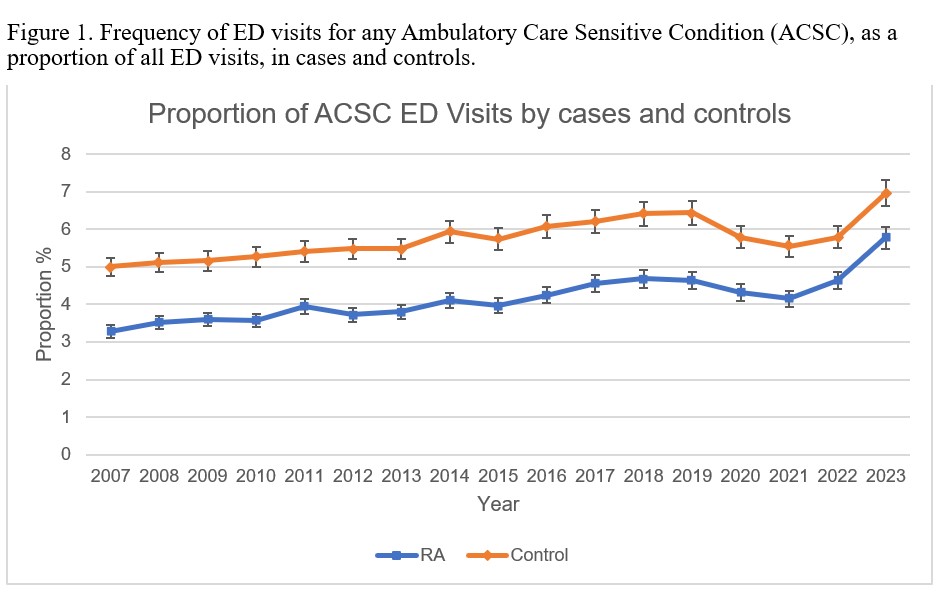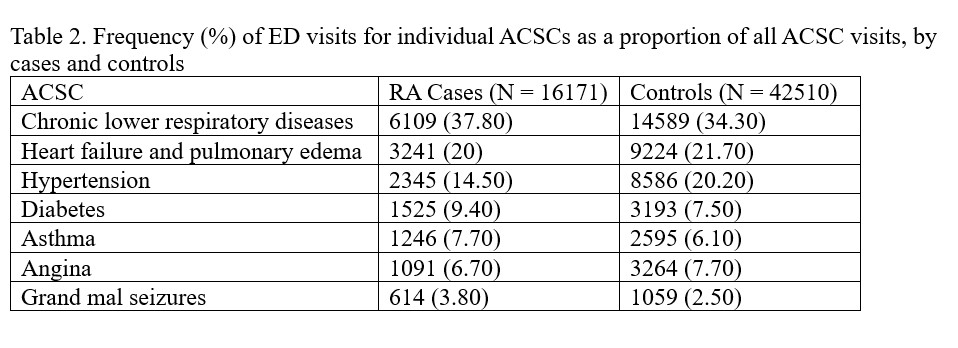Session Information
Session Type: Poster Session C
Session Time: 10:30AM-12:30PM
Background/Purpose: Ambulatory Care Sensitive Conditions (ACSCs) are conditions where appropriate access to ambulatory care could prevent or reduce complications, a more severe disease course, or the need for hospitalizations. We conducted this study to estimate the emergency department (ED) visit rates for ACSCs by persons with RA relative to age- and sex-matched general population controls.
Methods: We conducted a retrospective cohort study in Alberta, Canada, identifying individuals meeting a validated case definition for RA based on ICD-9-CM and ICD-10-CA/CM codes from 2002-2023. General population controls were identified by matching age, sex, and date of diagnosis. ED visits for any ACSC, as defined by the Canadian Institute for Health Information (including grand mal seizures, chronic lower respiratory diseases, asthma, diabetes, heart failure and pulmonary edema, hypertension, and angina) were identified by ICD codes listed as the most responsible diagnosis in the National Ambulatory Care Reporting System (NACRS). The frequency of any ACSC ED visit and incidence rate ratios (IRR) between cases and controls were calculated five years from date of diagnosis using a multivariable regression model, adjusting for age, sex, and location of residence.
Results: From the incident cohort of 52596 cases and 210384 controls, there were 39288 cases and 117828 controls with an ED visit (67% female, 56% urban, mean age 64 years; comparable between cases and controls). There was a 76% increase in the frequency of ED visits for ACSCs among cases over the study period, from 3.3% of all ED visits by cases in 2007 to 5.8% in 2023, in contrast to an approximate 39% increase in ACSC ED visits by controls over the same period (Figure 1). Both cases and controls had fewer ACSC visits for 2020-2022. Cases consistently had higher ED visit rates for ACSCs compared to controls (crude IRR 1.13, 95% Cl 1.10, 1.17), which persisted after adjusting for confounders (adjusted IRR 1.12, 95% Cl 1.08, 1.16).
Approximately 30% of all ACSC visits by cases were triaged as emergent (difference vs controls 1.43%, 95% CI 0.61, 2.26) (Table 1). The most common ACSC presentations were for chronic lower respiratory diseases (38% of all ACSC visits by cases), followed by heart failure and pulmonary edema (20%) and hypertension (15%) (Table 2). These same three ACSCs were the most frequently seen among controls.
Conclusion: People with RA have a 12% higher rate of avoidable ED visits in the first 5 years following diagnosis compared to those without RA. Over the years, more persons with RA have visited the ED for ACSCs, with a marked reduction during the COVID-19 pandemic restrictions. Improved ambulatory care access and quality, inclusive of primary care and subspecialty care, is proposed to reduce the burden on the acute care system and improve quality of care.
To cite this abstract in AMA style:
Contreras D, Bhanji Z, Avina-Zubieta J, Barber C, Barnabe C. Emergency Department Visits for Ambulatory Care Sensitive Conditions by Persons with Rheumatoid Arthritis: A Population-Based Study [abstract]. Arthritis Rheumatol. 2024; 76 (suppl 9). https://acrabstracts.org/abstract/emergency-department-visits-for-ambulatory-care-sensitive-conditions-by-persons-with-rheumatoid-arthritis-a-population-based-study/. Accessed .« Back to ACR Convergence 2024
ACR Meeting Abstracts - https://acrabstracts.org/abstract/emergency-department-visits-for-ambulatory-care-sensitive-conditions-by-persons-with-rheumatoid-arthritis-a-population-based-study/



